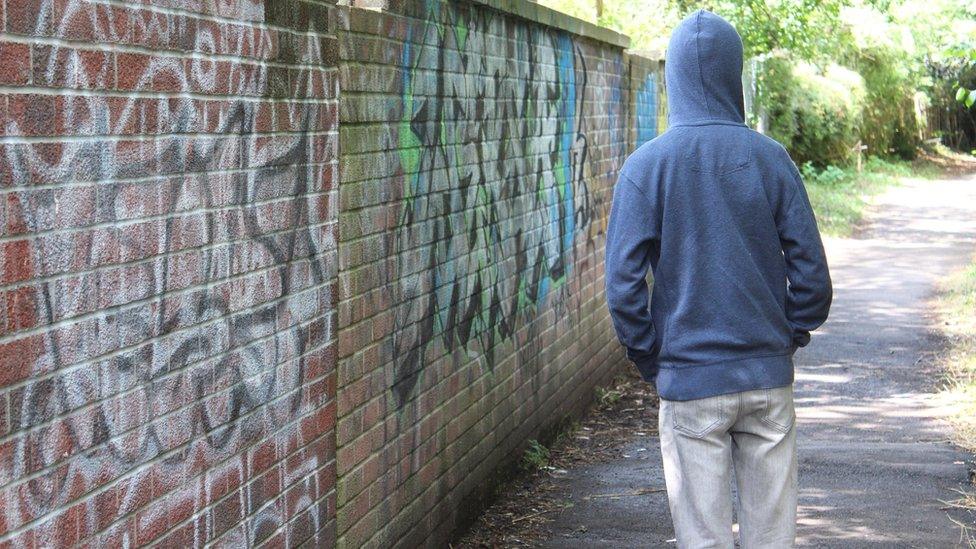Protect children from crime gangs, expert urges
- Published
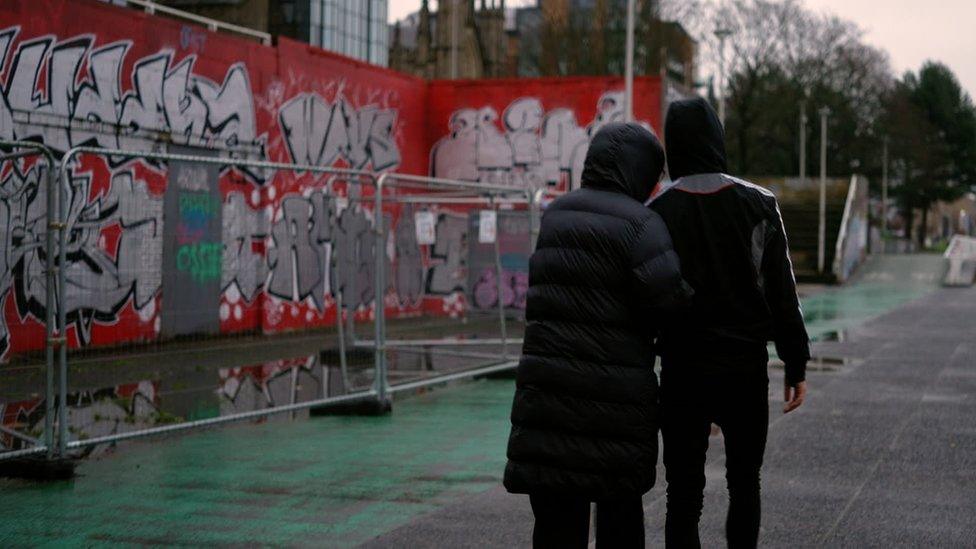
Joe, with his mother, Michelle, said a crime gang had controlled his life
Tens of thousands of children are at risk of being groomed and coerced into crime by organised gangs, according to a leading child-protection expert.
Prof Alexis Jay, who revealed the extent of sexual exploitation in Rotherham, told BBC News there was an "urgent and preventable crisis".
She said there was no national plan to deal with criminal exploitation of children, calling for new legislation.
The Home Office said it was investing up to £5m, to support victims.
Prof Jay, who previously chaired the Independent Inquiry into Child Sexual Abuse, took evidence from 70 people and organisations as part of her review for the charity Action for Children.
And she found the same techniques adopted by "grooming gangs" to sexually abuse young people were being used to draw children into crime.
Vulnerable children from poor backgrounds, or lacking social confidence, were targeted, befriended and rewarded for working for crime gangs.
Children with mental-health problems or a diagnosis such as ADHD were at particular risk of exploitation, Prof Jay found.
Children were being recruited to deal and deliver drugs or weapons and grow cannabis.
They were also involved in street robberies, burglaries, bike and phone theft, begging and pickpocketing.
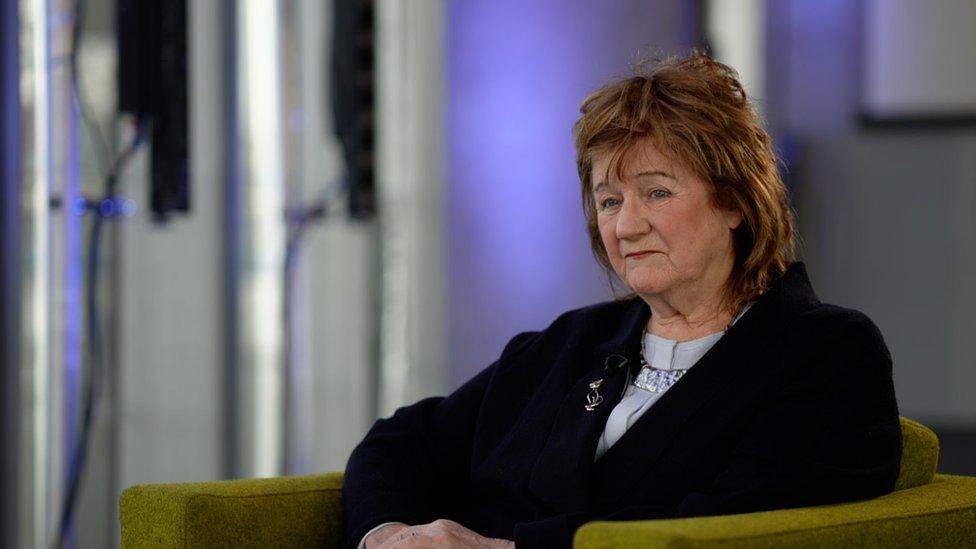
Prof Jay called for a national strategy and the introduction of a new offence of child criminal exploitation.
"There's no strategy at the moment," she said.
"It's uncoordinated, fragmented, piecemeal."
The Home Office said the £5m would fund:
programmes including a helpline for young people exploited by "county-lines" drug gangs
"specialist support-and-rescue service" for under-25s
An official called the "targeting, grooming and exploitation" "deplorable".
"We are committed to tackling child criminal exploitation and backing our police and partners with all the powers necessary to stamp out this behaviour," the official added.
Several schemes in Scotland aim to divert children away from exploitation and criminality.
The Scottish Government said keeping children safe from abuse and exploitation was a "key priority" and it was working with police, Action for Children and local authorities to improve its response.
A spokesperson said new guidance was published last year "to ensure practitioners have a shared understanding of criminal exploitation and to improve how to identify children and adults at risk of this type of abuse".
Action for Children employs youth workers, including former criminals, to help victims of the gangs.
'I got battered'
In Glasgow, teenager Joe - not his real name - described his life in the lower ranks of a powerful crime gang involved in drugs and violence.
If they knew he was talking to BBC News, he said, he could be murdered, so we are concealing his identity.
"I had no friends, I was by myself all the time," Joe said. "But if I did what they did, they were my friends. They controlled my life without me realising they were controlling my life."
Joe sold drugs and followed orders to attack the gang's rivals, facing violence himself unless he did what he what he was told.
"I got battered," Joe said. "I was pushed in front of moving vehicles."
The use of young people for criminal activities is also pushing up levels of teenage knife crime.
Prof Jay said: "What I found most shocking was the casual violence that was involved... knife crime, of course, but we also heard about the use of a range of weapons - machetes, bats, hammers and axes."
Jimmy - not his real name - a former drug addict and criminal working for a youth service in Glasgow, said exploitation had worsened over the past three years, with deprivation the biggest driver.
He saw the gangs as highly organised, with teenagers starting "work" at 09:00 handed a backpack of drugs, a burner phone, a bike and a knife, all of which were handed back at the end of the "shift".
One young drug dealer asked him recently: "What's the alternative? Because I do what I do, I can put power in my mum's electricity meter. I can put food on my brother and sister's table."
The biggest concern, Jimmy said, was they would simply work their way up the career-criminal ladder.
The bosses of these types of criminal gangs were millionaires, he said.
For Joe's mother, Michelle - not her real name - the crime gang were "like the devil". She knew who they were. "You want to kill them, she said, "but you can't do anything."
Criminals had even threatened families, to retain control over their children, Prof Jay found.
'Bad parent'
Michelle, a single parent, had been desperate to stop her son getting involved.
"I tried everything," she said. "I tried phoning the police, I tried going to the school. I tried social services. They told me it was all in my head, like I was a bad parent."
But Joe would never have become involved if she had been given help when she first asked for it - early intervention, as policymakers call it.
When Joe was arrested, he was finally given a youth worker, by one of eight Action for Children projects tackling criminal exploitation, in Scotland, Wales and the north-east of England.
He credits the charity with helping him realise he could escape the gang.
And his relationship with Michelle is now strong. "You know, my mum's always seen this light inside of me while everyone else has seen the darkness," Joe said.
Related topics
- Published30 January 2024
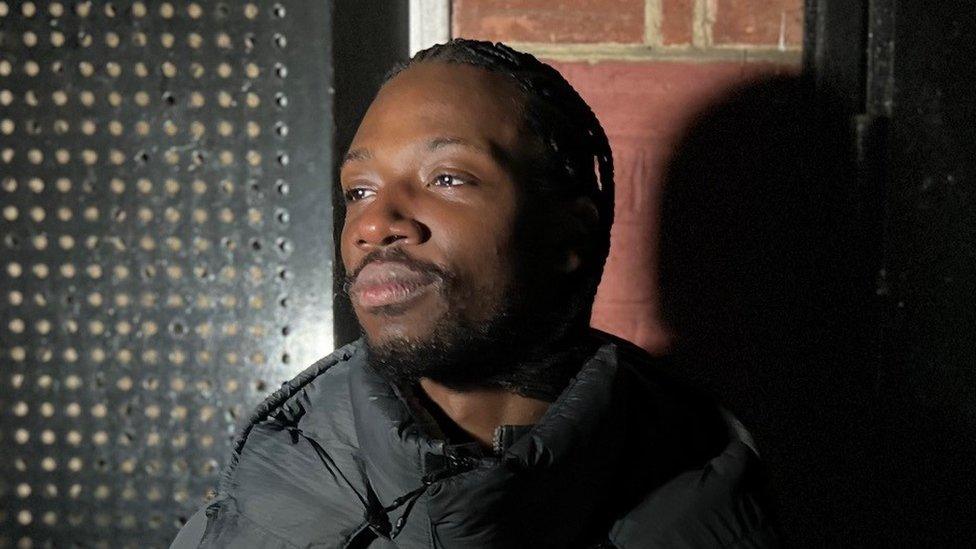
- Published6 February 2024
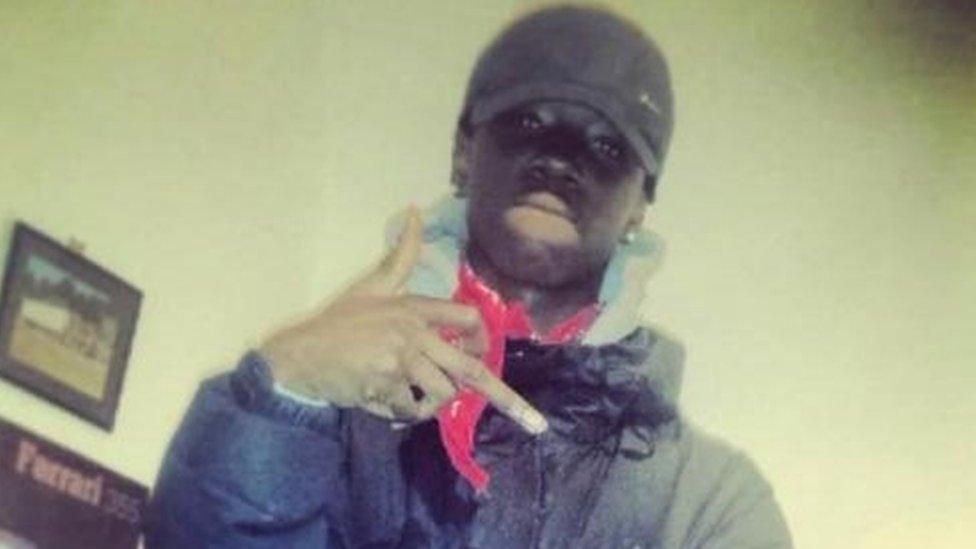
- Published28 February 2019
